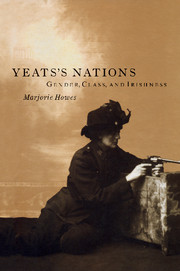Book contents
- Frontmatter
- Contents
- Acknowledgments
- List of abbreviations
- Introduction
- 1 That sweet insinuating feminine voice: hysterics, peasants, and the Celtic movement
- 2 Fair Erin as landlord: femininity and Anglo-Irish politics in The Countess Cathleen
- 3 When the mob becomes a people: nationalism and occult theatre
- 4 In the bedroom of the Big House: kindred, crisis, and Anglo-Irish nationality
- 5 Desiring women: feminine sexuality and Irish nationality in “A Woman Young and Old”
- 6 The rule of kindred: eugenics, Purgatory, and Yeats's race philosophy
- Notes
- Bibliography
- Index
6 - The rule of kindred: eugenics, Purgatory, and Yeats's race philosophy
Published online by Cambridge University Press: 06 July 2010
- Frontmatter
- Contents
- Acknowledgments
- List of abbreviations
- Introduction
- 1 That sweet insinuating feminine voice: hysterics, peasants, and the Celtic movement
- 2 Fair Erin as landlord: femininity and Anglo-Irish politics in The Countess Cathleen
- 3 When the mob becomes a people: nationalism and occult theatre
- 4 In the bedroom of the Big House: kindred, crisis, and Anglo-Irish nationality
- 5 Desiring women: feminine sexuality and Irish nationality in “A Woman Young and Old”
- 6 The rule of kindred: eugenics, Purgatory, and Yeats's race philosophy
- Notes
- Bibliography
- Index
Summary
What's equality? – Muck in the yard:
Historic Nations grow
From above to below.
(VP, 547)In recent years there has been much debate and little agreement over Yeats's late politics, particularly their relationship to fascism. The question of “Yeats's fascism,” however, does not generate the most revealing answers about his work and attitudes during the 1930s. This chapter will argue that the most useful way to assess Yeats's late politics – and the conception of nationality they embody – is to approach them through the recognition that Yeats's central political philosophy during these years was, in his words, a “race philosophy” which accorded with European fascism in some respects and differed from it in others. This race philosophy, with, of course, some changes of structure and emphasis, provides a thread of consistency linking Yeats's construction of Anglo-Irishness in the 1920s, his increasing preoccupation with authority and public order in postcolonial Ireland, his interest in eugenics, his flirtation with fascism, and the harsh rhetoric of On the Boiler and Purgatory. The model of Irish nationality in Yeats's later works extended and refigured his Anglo-Irish meditations and his definition of kindred as both tradition and its crisis. Most of the elements of this nationality were in place by the time he became explicitly interested in the British eugenics movement, but his particular version of eugenic thinking was crucial to it throughout the 1930s.
When I say that the intellectual structures of Yeats's Anglo-Irish nationality in his later years were eugenic, I am not referring simply to the thematic preoccupation with degeneration, lineage and breeding that Paul Scott Stanfield has traced quite ably in Yeats's work beginning as early as 1904.
- Type
- Chapter
- Information
- Yeats's NationsGender, Class, and Irishness, pp. 160 - 185Publisher: Cambridge University PressPrint publication year: 1996



